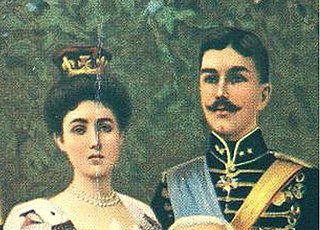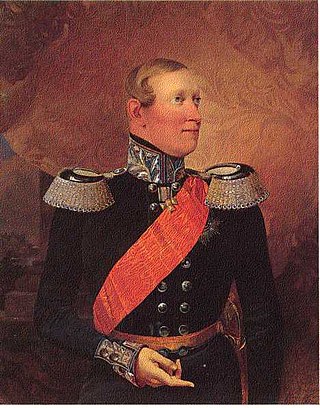Related Research Articles

The House of Hohenzollern is a formerly royal German dynasty whose members were variously princes, electors, kings and emperors of Hohenzollern, Brandenburg, Prussia, the German Empire, and Romania. The family came from the area around the town of Hechingen in Swabia during the late 11th century and took their name from Hohenzollern Castle. The first ancestors of the Hohenzollerns were mentioned in 1061.

A duchy, also called a dukedom, is a medieval country, territory, fief, or domain ruled by a duke or duchess, a ruler hierarchically second to the king or queen in Western European tradition.

The Grand Duke of Luxembourg is the head of state of Luxembourg. Luxembourg has been a grand duchy since 15 March 1815, when it was created from territory of the former Duchy of Luxembourg. It was in personal union with the United Kingdom of the Netherlands until 1890 under the House of Orange-Nassau. Luxembourg is the world's only sovereign Grand Duchy and since 1815, there have been nine monarchs, including the incumbent, Henri.
An heir apparent or simply heir is a person who is first in an order of succession and cannot be displaced from inheriting by the birth of another person. A person who is first in the current order of succession but could be displaced by the birth of a more eligible heir is known as heir presumptive.

Frederick William II was king of Prussia from 1786 until his death in 1797. He was in personal union with the prince-elector of Brandenburg and sovereign prince of the Canton of Neuchâtel. As a defensive reaction to the French Revolution, Frederick William II ended the German Dualism between Prussia and Austria. Domestically, he turned away from the enlightened style of government of his predecessor and introduced a tightened system of censorship and religious control. The king was an important patron of the arts especially in the field of music. As a skilled cellist he enjoyed the dedication of various cello-centric compositions by composers Mozart, Haydn, Boccherini, and Beethoven. He was also responsible for some of the most notable architecture in Prussia, including the Brandenburg Gate in Berlin, the Marble Palace, and Orangery in the New Garden, Potsdam.

Duke of Rothesay is the main dynastic title traditionally given to the male heir apparent to the Scottish and, later, British thrones. The dukedom was created in 1398 by Robert III of Scotland for his eldest son.

A crown prince or hereditary prince is the heir apparent to the throne in a royal or imperial monarchy. The female form of the title is crown princess, which may refer either to an heiress apparent or, especially in earlier times, to the wife of the person styled crown prince.
An heir presumptive is the person entitled to inherit a throne, peerage, or other hereditary honour, but whose position can be displaced by the birth of a person with a better claim to the position in question. This is in contrast to an heir apparent, whose claim on the position cannot be displaced in this manner.

Prince of Orange is a title associated with the sovereign Principality of Orange, in what is now southern France and subsequently held by the stadtholders of, and then the heirs apparent of, the Netherlands.
The Malay language has a complex system of styles, titles and honorifics which are used extensively in Brunei Darussalam, Malaysia and Singapore.
Baron Brocket, of Brocket Hall in the County of Hertford, is a title in the Peerage of the United Kingdom. It was created on 19 January 1933 for the businessman Sir Charles Nall-Cain, 1st Baronet. He was chairman of the brewing firm of Robert Cain & Sons, which had been founded by his father Robert Cain. Before his elevation to the peerage, Nall-Cain had been created a baronet, of the Node, in 1921. His son, the second Baron, represented Wavertree in the House of Commons as a Conservative. As of 2017 the titles are held by the latter's grandson, the third Baron, who succeeded in 1967.

Wilhelm, German Crown Prince, Crown Prince of Prussia was the eldest child of the last Kaiser, Wilhelm II, German Emperor, and his consort Augusta Victoria of Schleswig-Holstein, and thus a great-grandson of Queen Victoria, and distant cousin to many British royals, such as Queen Elizabeth II. As Emperor Wilhelm's heir, he was the last Crown Prince of the German Empire and the Kingdom of Prussia, until the abolition of the monarchy.

Paul Friedrich ruled as Grand Duke of Mecklenburg-Schwerin from 1837 to 1842.

King in Prussia was a title used by the Prussian kings from 1701 to 1772. Subsequently, they used the title King of Prussia.

Georg Friedrich, Prince of Prussia is a German businessman who is the current head of the Prussian branch of the House of Hohenzollern, the former ruling dynasty of the German Empire and of the Kingdom of Prussia. He is the great-great-grandson and historic heir of Wilhelm II, the last German Emperor and King of Prussia, who abdicated and went into exile upon Germany's defeat in World War I in 1918. Thus he is a fourth great-grandson of Queen Victoria of the United Kingdom and a distant cousin of many European monarchs.
Infante, also anglicised as "infant" or translated as "prince", is the title and rank given in the Iberian kingdoms of Spain and Portugal to the sons and daughters (infantas) of the king, regardless of age, sometimes with the exception of the heir apparent or heir presumptive to the throne who usually bears a unique princely or ducal title. A woman married to a male infante was accorded the title of infanta if the marriage was dynastically approved, although since 1987 this is no longer automatically the case in Spain. Husbands of born infantas did not obtain the title of infante through marriage, although they were occasionally elevated to the title de gracia at the sovereign's command.

Louis Ferdinand, Prince of Prussia was a member of the princely House of Hohenzollern, which occupied the Prussian and German thrones until the abolition of those monarchies in 1918. He was also noteworthy as a businessman and patron of the arts.

Princess Frederica Charlotte of Prussia was a Prussian princess by birth and a British princess by marriage. She was the eldest daughter of King Frederick William II of Prussia and the wife of Prince Frederick, Duke of York and Albany, second son of King George III of the United Kingdom.